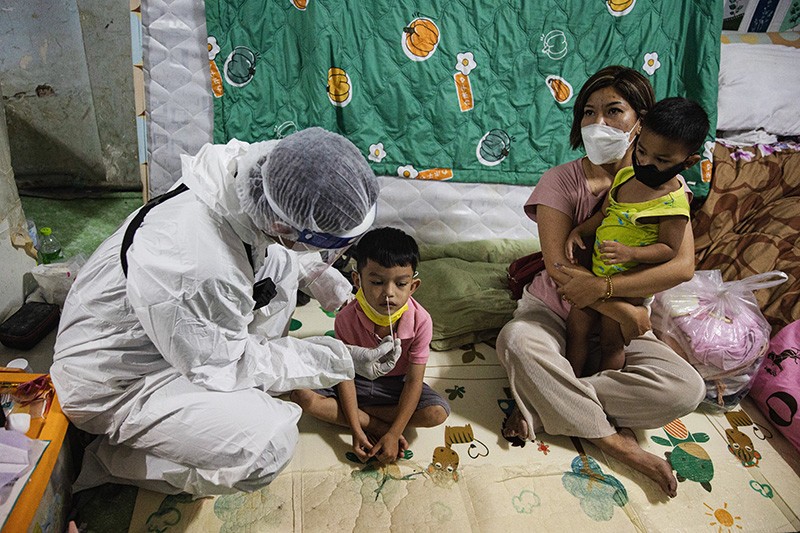Children infected with SARS-CoV-2 are less likely than adults to produce antibodies against the virus, despite having similar symptoms and levels of virus in their bodies, according to a small study in Australia1.
Researchers say the findings add to the growing body of evidence suggesting that children have a more robust initial immune response to COVID-19 and can clear the infection quickly, compared with adults. But because antibodies are likely to be important for guarding against reinfection, the findings raise questions about how well protected children might be against future infections.
The study, published in JAMA Network Open on 9 March, looked at 57 children with a median age of 4 and 51 adults with a median age of 37, who tested positive for SARS-CoV-2 between 10 May and 28 October 2020. Participants had mild symptoms, such as headaches and fevers, or were asymptomatic.
The researchers took nose and throat swabs to measure participants’ levels of viral RNA, and blood samples to check for immunoglobulin G antibodies against the virus. They found that children and adults had similar viral loads, but only 37% of the children produced SARS-CoV-2 antibodies, compared with 76% of the adults.
Previous studies have also seen differing antibody responses in kids compared with adults. An analysis2 by Donna Farber, an immunologist at Columbia University in New York City, and her colleagues found that adults produce a broader set of antibodies, including more virus-blocking antibodies, than children do. Farber says the Australian analysis “confirms and extends those findings”.
Vigorous response
Children could be producing fewer antibodies because they have a more robust innate immune response than adults. This is the first line of defence against pathogens, and is non-specific. Children could also be better at responding to infections where they enter the body, such as through the throat or nose. This means that the body clears the virus quickly and it doesn’t “hang around” to trigger the adaptive response that produces antibodies, says Farber.
Other studies3,4, including by Kerstin Meyer, a cellular geneticist at the Wellcome Sanger Institute in Hinxton, UK, have shown that children mount a stronger and faster response to an infection, and that the innate immune system has an important role in that response. The younger the child, the more likely it is that their innate immune system is driving that response, says Meyer.
But Paul Licciardi, an immunologist at Murdoch Children’s Research Institute in Melbourne and co-author of the Australian study, says that when he and his team looked at innate immune cells in a small group of children, they didn’t find a stronger response in those who didn’t produce antibodies. This is something to look into, he says.
The Australian team also measured some participants’ levels of immune cells in the blood. They found lower levels of certain classes of antibody-producing memory B cells and memory T cells in children than in adults. This suggests that kids mount less of an adaptive immune response, which is more targeted and generates immune memory, says Betsy Herold, a paediatric infectious-disease physician at Albert Einstein College of Medicine in New York City.
Uncertain protection
The team worries that if kids have a less vigorous adaptive immune response, that could put them at risk of reinfection. But Herold calls for caution here: “We don’t have the data yet to make that conclusion.” Children might not be as protected from reinfection, but they are still at very low risk of complications from the initial infection, says Meyer.
The Australian study also looked only at people who were infected with early variants of SARS-CoV-2, but the results might differ for the more-infectious Delta and Omicron variants. In preliminary analyses of people infected with Delta in 2021, Licciardi says he and his team found that most children and adults produced antibodies in response to an infection, which could be because Delta is associated with higher viral loads. The Australian team is now collecting immunological data from people who have been infected with Omicron.
"low" - Google News
March 10, 2022 at 07:14AM
https://ift.tt/vgWOJA2
Kids show mysteriously low levels of COVID antibodies - Nature.com
"low" - Google News
https://ift.tt/ZCgtyBF
Bagikan Berita Ini
















0 Response to "Kids show mysteriously low levels of COVID antibodies - Nature.com"
Post a Comment